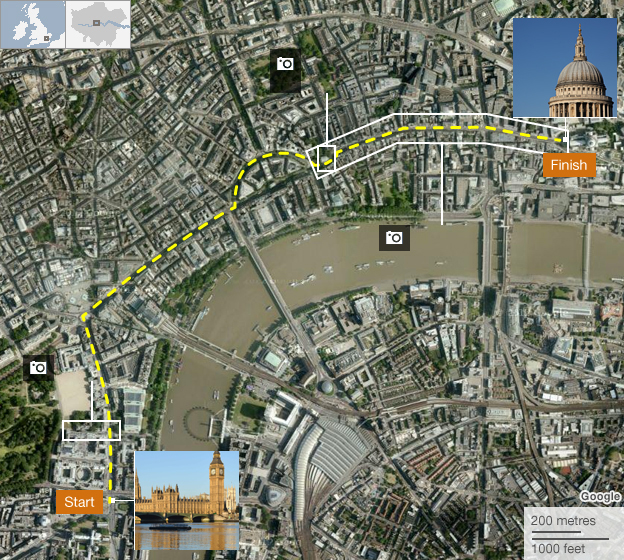David Cameron: Thatcher an extraordinary leader
- Published
David Cameron says Margaret Thatcher "made our country great again"
David Cameron has paid tribute to Baroness Thatcher as an "extraordinary leader and an extraordinary woman".
Mr Cameron told MPs at the start of a specially convened session the former prime minister "defined and overcame the great challenges of her age".
He praised her achievements in breaking through the "glass ceiling" and said she had made Britain "great" again.
Ed Miliband said she had been a "unique and towering figure" but said he had disagreed with much of what she did.
Mr Cameron opened the six-hour tribute debate in the Commons, saying: "As Winston Churchill put it there are some politicians who make the weather and Margaret Thatcher was undoubtedly one of them."
'From grocer's shop to PM'
He added: "They say 'cometh the hour, cometh the man', well in 1979 came the hour and came the lady.
"She made the political weather, she made history and let this be her epitaph - that she made this country great again."
He described her "remarkable" achievements in becoming both leader of the Conservative Party and prime minister at a time when it was "almost inconceivable" a woman could hold these roles.
"Those of us who grew up before Margaret Thatcher was even in Downing Street can sometimes fail to appreciate the thickness of the glass ceiling she broke through - from a grocer's shop in Grantham to the highest office in the land," he said.
The Labour leader acknowledged the ways in which Margaret Thatcher had shaped the country, highlighting the Falkland Islands and parts of the privatisation programme as successes.
But he also said it was important to reflect where she had been wrong - picking out mining and Baroness Thatcher's position on Nelson Mandela and South Africa.
Mr Miliband told the Commons: "Whatever your view of her, Margaret Thatcher was a unique and towering figure.
"I disagreed with much of what she did but I respect what her death means for many, many people who admired her and I honour her personal achievements."
Deputy Prime Minister Nick Clegg said although it was fair to "shun the tenets of Thatcherism" it was possible to still respect Lady Thatcher's personal achievements.
"Her memory will no doubt continue to divide opinion and stir deep emotion," he said. "But as we as a nation say farewell to a figure who looms so large, one thing's for sure, the memory of her will continue undimmed, strong and clear for years to come, in keeping with the unusual and unique character of Margaret Thatcher herself."
'Scorched earth policy'
Conservative MPs queued up to pay their respects to their former leader.
John Redwood called her "a great lady, and a great stateswoman". Peter Lilley, who served as a minister under Lady Thatcher, praised her for her ability to convert her opponents and Conor Burns, a close friend of the former prime minister, described her as an "inspiration".
Some Labour MPs have stayed away in protest at the debate, labelling it a waste of money and a "misuse of Parliament".
However, some used it as an opportunity to express critical views about Baroness Thatcher's time in Downing Street.
Labour leader Ed Miliband paid tribute to Lady Thatcher's ability to ''overcome every obstacle in her path''
Former Labour minister Michael Meacher said she had embarked on a "scorched earth policy" and left industrial communities "desolated". Veteran Labour MP David Winnick said Thatcher's policies caused "huge pain and suffering among ordinary people", while Glenda Jackson described life under Thatcherism for her north London constituents as "grim" and "Hogarthian".
The SNP's Angus Robertson said that while it was right to acknowledge Lady Thatcher as a "formidable politician", Scotland would "never forget and never forgive" the introduction of the community charge, known as the poll tax, a year earlier than the rest of the UK.
There was also criticism from DUP MP Nigel Dodds for the Anglo Irish Agreement, which Lady Thatcher signed in 1985, but he said in later life she had regretted it as a mistake.
After the last death of a former prime minister, Sir Edward Heath, in 2005, the Commons staged an hour-long debate to pay tribute. Up to seven-and-a-half hours has been set aside for Lady Thatcher.
In the Lords, those who have paid tribute include Lord Fowler and Lord Tebbit, both cabinet ministers during Lady Thatcher's premiership, although Lord Heseltine, who challenged her for the Conservative Party leadership, is not expected to speak.
Funeral arrangements
Lady Thatcher's funeral will take place next Wednesday at St Paul's Cathedral. The Queen and the Duke of Edinburgh have confirmed they will attend.
It will be the first time that the sovereign has attended the funeral of a British politician since that of Sir Winston Churchill in 1965.
Former Labour prime ministers Tony Blair and Gordon Brown have said they will be attending, as will FW de Klerk, the last president of apartheid in South Africa.
Lady Thatcher's family is meeting an unspecified amount of the expense, thought to cover transport, flowers and the cremation, with the government funding the rest, including security.
No official figure has been given for the estimated overall costs, although newspaper reports suggest it could be up to £10m.
Downing Street said the cost of the funeral would not be released until after the event.
More than 700 armed forces personnel will line the route of the procession from Westminster to St Paul's, including three bands whose drums will be covered in black cloth.
A gun salute will be fired from the Tower of London and the coffin will be carried into St Paul's by service personnel from regiments and ships closely associated with the Falklands campaign.
Lady Thatcher was prime minister from 1979 to 1990, winning three successive general elections. She died "peacefully" on Monday after suffering a stroke while staying at the Ritz hotel in central London.
Westminster
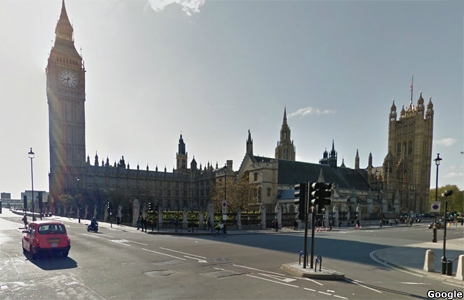
The funeral procession will set out from the Palace of Westminster with Baroness Thatcher's body carried in a hearse for the first part of the journey. The coffin will be trasferred to a gun carriage at the church of St Clement Danes on the Strand.
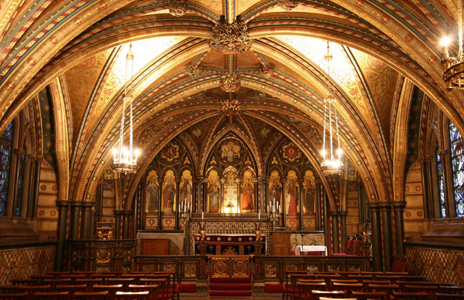
Baroness Thatcher's body will lie overnight in the Chapel of St Mary Undercroft which is found beneath St Stephen's Hall at the Palace of Westminster.
St Clement Danes
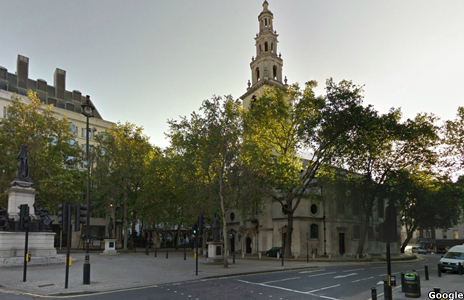
At the RAF Chapel at the church of St Clement Danes on the Strand, Baroness Thatcher's coffin will be borne in procession to St Paul's Cathedral on a gun carriage drawn by six horses of the King's Troop Royal Horse Artillery.
St Paul's Cathedral
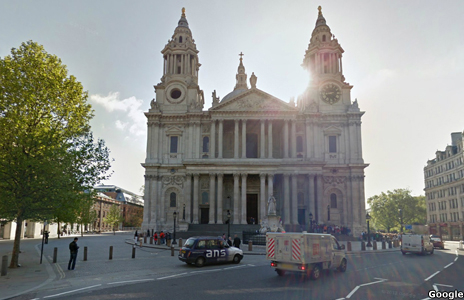
There will be a Guard of Honour outside St Paul's as the coffin is transferred into the Cathedral by service personnel from regiments and ships closely associated with the Falklands campaign.
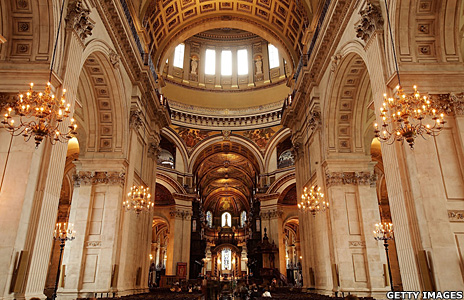
The ceremony in St Paul's Cathedral will be attended by the Queen and Duke of Edinburgh, family and friends of Baroness Thatcher, members of her cabinets and dignitaries from around the world.
Downing Street
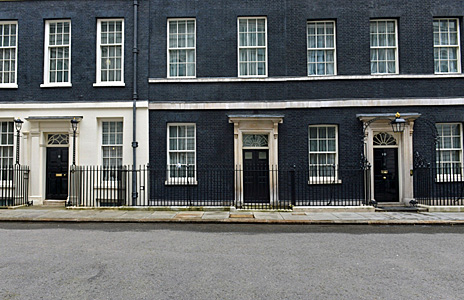
The funeral passes Downing Street, which is found on the left of the route along Whitehall.
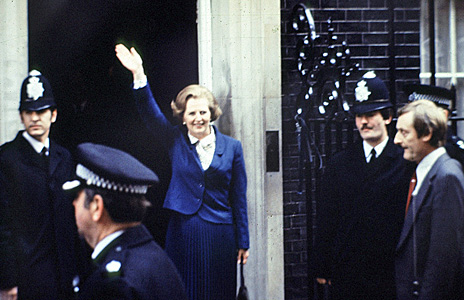
Baroness Thatcher was resident at Number 10 for more than ten years following her General Election victory in 1979.
Ceremonial procession
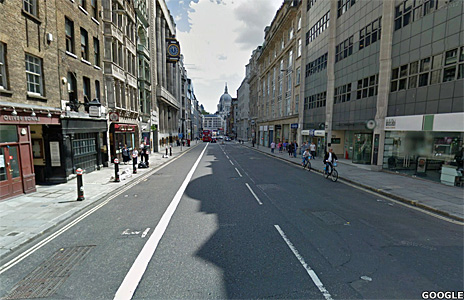
Once the procession leaves St Clement Danes, the route to St Paul's along Fleet Street and Ludgate Hill will be lined by more than 700 armed forces personnel from the Royal Navy and Royal Marines, F Company Scots Guards, 1st Battalion Welsh Guards, and the Royal Air Force.
 Thatcher: In her own words
Thatcher: In her own words
 'Thatcher saved our country'
'Thatcher saved our country'
 How the papers reacted
How the papers reacted
 How will you remember her?
How will you remember her?
 Global tributes to Thatcher
Global tributes to Thatcher
 A tale of two Yorkshires
A tale of two Yorkshires
 Thatcher 'liked a fierce row'
Thatcher 'liked a fierce row'
 The photo she 'saw as her best'
The photo she 'saw as her best'
